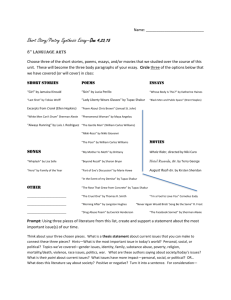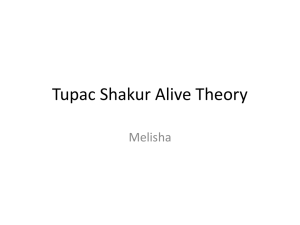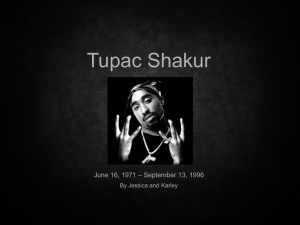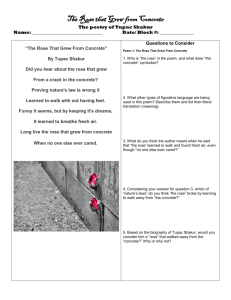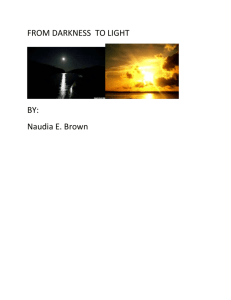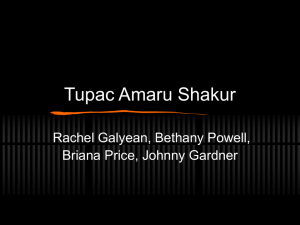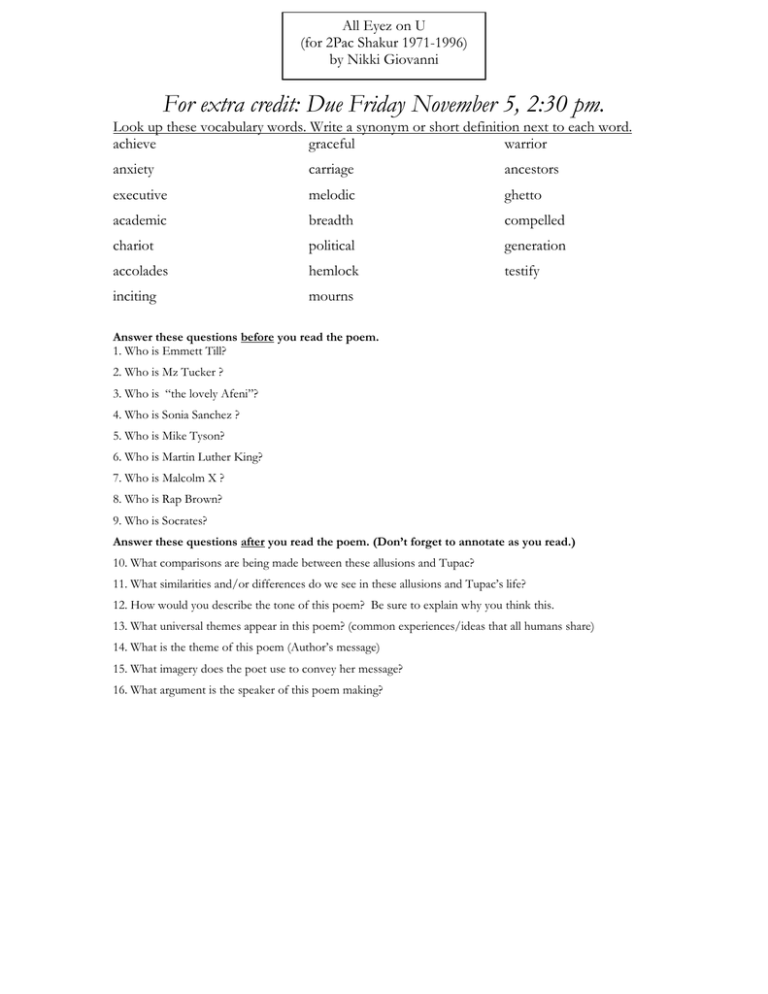
All Eyez on U
(for 2Pac Shakur 1971-1996)
by Nikki Giovanni
For extra credit: Due Friday November 5, 2:30 pm.
Look up these vocabulary words. Write a synonym or short definition next to each word.
achieve
graceful
warrior
anxiety
carriage
ancestors
executive
melodic
ghetto
academic
breadth
compelled
chariot
political
generation
accolades
hemlock
testify
inciting
mourns
Answer these questions before you read the poem.
1. Who is Emmett Till?
2. Who is Mz Tucker ?
3. Who is “the lovely Afeni”?
4. Who is Sonia Sanchez ?
5. Who is Mike Tyson?
6. Who is Martin Luther King?
7. Who is Malcolm X ?
8. Who is Rap Brown?
9. Who is Socrates?
Answer these questions after you read the poem. (Don’t forget to annotate as you read.)
10. What comparisons are being made between these allusions and Tupac?
11. What similarities and/or differences do we see in these allusions and Tupac’s life?
12. How would you describe the tone of this poem? Be sure to explain why you think this.
13. What universal themes appear in this poem? (common experiences/ideas that all humans share)
14. What is the theme of this poem (Author’s message)
15. What imagery does the poet use to convey her message?
16. What argument is the speaker of this poem making?
Biographies
Baraka, Amiri (Leroi Jones) (1934—) Writer Amiri Baraka founded the 1960s
Black Arts Movement, transforming white, liberal aesthetics into black nationalist poetics
and politics. In 1967, he converted to Islam and changed his name from Leroi Jones to
Amiri Baraka. His career can be divided in three stages: beatnik/bohemian (1957-1964),
black nationalism (1965-1974), and Marxist revolutionary (1974-present). In 1960 he
travelled to Cuba with a group of black artists. As a result, he grew disillusioned with the
bohemian/beatnik atmosphere of Greenwich Village and began seeing the necessity of art as
a political tool. The play Dutchman (1964) brought him into the public limelight, a one-act
play about Clay, a young, black, educated man who, while riding the New York subway, is
murdered by a beautiful white woman symbolizing white society. No American writer has
been more committed to social justice than Amiri Baraka. He is dedicated to bringing the
voices of black America into the fiber of his writings.
H. Rap Brown was born in Baton Rouge on 4th October 1943. While attending
Southern University (1960 to 1964) he joined the civil rights organization, Student
Nonviolent Coordinating Committee (SNCC). By 1968 Brown had completely abandoned
his pacifist beliefs and joined the Black Panther Party. He quickly developed a reputation for
extremist views reflected in his book, Die Nigger Die! (1969). Imprisoned several times
between 1967 and 1970, Brown was eventually shot and captured by New York City police
during an armed robbery. In Attica Prison, he converted to Islam and changed his name to
Jamil Abdullah Al-Amin. After his release in 1976 Al-Amin became a grocery store owner in
Atlanta. He also became leader of the National Ummah, one of America's largest black
Muslim groups. In March, 2000, two police officers went to Al-Amin's store to arrest him
for theft. Al-Amin opened fire on the officers with an assault rifle. Both officers were
wounded. Evidence was produced in court that while the officer lay bleeding, Al-Amin
produced a handgun and shot him three times. Two years later Al-Amin was found guilty of
murder and sentenced to life imprisonment.
From http://www.spartacus.schoolnet.co.uk/USArapB.htm
Emmett Till was born near Chicago, Illinois, on 25th
July, 1941. In 1955, Emmett, now14, was to Mississippi to
stay with relatives. During the evening of 24th August,
Emmett, a cousin, and a group of his friends went to
Bryant's Grocery Store. Carolyn Bryant claimed that
Emmett grabbed her at the waist and asked her for a date.
When pulled away by his cousin, Emmett allegedly said,
"Bye, baby" and "wolf whistled". Bryant told her husband
about the incident and he decided to punish the boy. The following Saturday, Roy Bryant
and his half-brother, J. W. Milam, took Emmett from the house where he was staying and
drove him to the Tallahatchie River and shot him in the head. After Emmett's body was
found, Bryant and Milam were charged with murder. In court Mose Wright identified Bryant
and Milam as the two men who took away his nephew on the 24th August. Other African
Americans also gave evidence against Bryant and Milam but after four days of testimony, the
all white jury acquitted the men.
From http://www.spartacus.schoolnet.co.uk/USAtillE.htm
Mike Tyson, (born June 30, 1966,
Brooklyn, New York, USA) is a former
American professional boxer and World
Heavyweight Champion, and is considered by
many to be one of the greatest and most feared
heavyweight boxers of all time. In his prime, he
routinely defeated prominent opponents in
devastating fashion, and was one of the most
feared boxers in the sport.
His once immensely promising career
was undermined by serious personal problems, lack of preparation, and periods of
imprisonment. Upon release of his first prison sentence, he made a heavily anticipated
comeback, but failed to reclaim his previous dominance. On June 11, 2005, Tyson suffered a
defeat to journeyman Kevin McBride, and shortly after unofficially retired from the sport.
In 1992, Tyson went on trial in Indiana after being arrested there in 1991 for the
rape of Miss Black Rhode Island, Desiree Washington in an Indianapolis hotel room. Tyson
was convicted on the charge of rape on February 10 1992. While in prison, Tyson converted
to Islam and adopted the name "Malik Abdul Aziz".[2] Tyson was good friends with late
rapper Tupac Shakur.
Socrates, Greek philosopher and educational reformer of the fifth
century B.C.; born at Athens, 469 B.C.; died there, 399 B.C. Socrates
was, above all things, a reformer. He was alarmed at the condition of
affairs in Athens. After having received the usual Athenian education
in music (which included literature), geometry, and gymnastics, he
practiced the craft of sculptor, working, we are told, in his father's
workshop, but he gave up his occupation in order to devote himself to
the moral and intellectual reform of his fellow citizens. He devoted
himself to this mission with extraordinary zeal and singleness of
purpose. He was the most unconventional of teachers and not tactful.
He enjoyed all sorts of rough and even vulgar mannerisms, and
purposely shocked the more refined sensibilities of his fellow citizens. The opposition to
him ended in formal accusations of not believing in the gods and subverting (going against)
existing moral traditions. He met these accusations with defiance and provoked his
opponents with a speech in which he affirmed his innocence of all wrongdoing, and refused
to retract or apologize for anything that he had said or done. He was condemned to drink
the poison hemlock and, when the time came, met his fate with a calmness and dignity
which have earned for him a high place among those who suffered unjustly.
Taken from http://www.newadvent.org/cathen/14119a.htm
Malcolm X (1925 - 1965) African-American activist, born on May 19,
1925 in Omaha, Nebraska, USA. He claimed that his father, a minister and
follower of Marcus Garvey, was murdered by racists in Lansing, MI (1931)
(but at least one researcher claims his father died accidentally). Moving to
Boston, he turned to pimping and drugs as a teenager, and was sentenced to
10 years in prison for burglary (1946), where he discovered the anti-white
Black Muslims. Joining the Muslims (1952), he became a recruiter, changed
his name, and came to national attention with his writings and through a television
documentary (1959), both of which tended to portray him as a threat to white people. Before
his assassination in 1965. , he came to believe that leaders of the Nation of Islam and
powerful elements within the US government wanted him dead; the only legal trial put all the
blame on members of the Nation of Islam. Alex Haley helped immortalize him as co-author
of The Autobiography of Malcolm X (1965), and Spike Lee's 1992 film renewed interest in
the man and his message. He proved as powerful after his death as alive, influencing
disparate movements with his positions on black power and neo-colonialism, and
transforming the consciousness of a generation of African-Americans.
Martin Luther King, Jr. (1929 – 1968). The grandson and son of Baptist ministers,
young Martin attended segregated public schools and graduated from high school at age 15.
In 1948, he received his B.A. degree from Morehouse College in Georgia and in 1951 he
earned is B.D. from Crozer Theological Seminary. While at Crozer, King was elected
president of a predominantly white senior class. In 1955, he received a Ph.D. from Boston
University, where he also met his future wife, Coretta Scott. Committed to black civil rights
from an early age, King was an active member of the executive committee of the National
Association for the Advancement of Colored People. When Rosa Parks refused to give up
her seat in a bus in December 1955, King led the boycott of Montgomery's segregated buses
for over a year. The situation became so intense that he was arrested, he and his family were
threatened, and his home was bombed. Eventually the Supreme Court outlawed
discrimination in public transportation, and King emerged a prominent leader of the civil
rights movement. King’s nonviolence approach was based on the ideas of Henry David
Thoreau and Mohandas Gandhi, as well on Christian teachings. His marches and protests
won media attention and public sympathy for the injustices toward his race. During these
years, King was arrested and jailed by Southern officials on several occasions, was stoned
and physically attacked, and his house was bombed. King's finest hour came on August 28,
1963 when he led the great march in Washington, DC, that culminated with his famous "I
Have a Dream" speech at the Lincoln Memorial. More than a quarter million people of all
ethnicities attended the event, making it the largest gathering of protesters in Washington's
history. The Civil Rights Act and the Voting Rights Act were passed a year later. King was
awarded the Nobel Peace Prize in 1964 at age 35, becoming the award's youngest recipient.
King organized the Poor People's Campaign in 1968. The organization demanded
aid for the poorest communities in the United States. Critics called this switch in agenda a
new brand of democratic socialism. In the spring of 1968, King went to Memphis,
Tennessee, to show support for black city workers striking for higher wages and better
treatment. He was shot and killed on April 4, 1968 as he stood on the balcony of his motel.
He was 39 years old. President Carter acknowledged King's contributions by posthumously
awarding him the Presidential Medal of Freedom in 1977.
© 2007 A&E Television Networks. All rights reserved.
Sonia Sanchez (born Sept. 9, 1934, Birmingham, Ala., U.S.) is an American poet,
playwright, and educator who was noted for her black activism. Sanchez lost her mother as
an infant, and her father moved the family to Harlem, New York City, when she was nine.
She received a B.A. (1955) in political science from Hunter College in Manhattan and briefly
studied writing at New York University. In the 1960s Sanchez was introduced to the political
activism of the times and published poetry in such journals as The Liberator, Journal of
Black Poetry, Black Dialogue, and Negro Digest. Her first book, Homecoming (1969),
contains considerable invective against “white America” and “white violence”; thereafter she
continued to write on what she called the “neoslavery” of blacks, as socially and
psychologically unfree beings. She also wrote about sexism, child abuse, and generational
and class conflicts. A good deal of Sanchez' verse is written in American black speech
patterns, eschewing formal English grammar and pronunciations.
Copyright © 1994-2008 Encyclopædia Britannica, Inc.
C. DeLores Tucker American activist C. DeLores Tucker (born 1927) has risen to
national prominence in African American civil rights circles through her tireless activism and
political fundraising. The struggle to end racism and make her world a more equal,
multicultural society dates back to the 1940s for C. DeLores Tucker. In the decades since
then she has become a respected--and indeed even feared--personality. She counts among
her personal friends and associates some equally stellar activists for the black cause,
including Coretta Scott King, the Reverend Desmond Tutu, and Colin Powell. Her career in
civil rights has spanned the entire latter half of the twentieth century. In the 1990s, she
became a vocal opponent of demeaning images of minorities in rap music and did not shirk
from blaming the African Americans she felt were ultimately responsible. In 1997, Dr. C.
Delores Tucker, an outspoken critic of gangsta rap, filed a $10 million lawsuit against the
estate of the late rapper Tupac Shakur, charging that he made derogatory comments about
her in his music. Dr. Tucker, chair of the National Political Congress of Black Women Inc.,
says songs on Shakur's hit album All Eyez On Me have caused her "mental pain, suffering
and inconvenience." On the tune Wonda Why They Call U B-----h Shakur raps: "Got your
legs up trying to get rich. Keep your head up and your legs closed Dear Ms. Delores
Tucker." Dr. Tucker states in the suit that the lyrics allude "to prostitution and tells why
women are called bitches." On the tune How Do You Want It Shakur raps: "C. Delores
Tucker .... instead of trying to help a brother you destroy a nigga." Like the other battles she
has engaged in, this crusade and her outspokenness earned her enemies. Yet Tucker views
the projects to which she commits herself--electing more African Americans to public office,
for example, or halting the sale of offensive rap music to minors--as part of a larger goal, "to
give our children an alternative environment that will help them shape their character,"
Tucker told Washington Post journalist Judith Weintraub.
Tupac Shakur (1971-1996) Rapper, actor. Born on June 16, 1971, in New York, New York.
Shakur has become a legend in hip-hop and rap circles for his talent, his violent behavior,
and his brutal death. The son of a Black Panther activist, Afeni Shakur, Tupac moved
around a lot as a child. In his youth, he explored acting by becoming a member of the 127th
Street Ensemble, a Harlem-based theater company. As a teenager, Shakur attended the
Baltimore School for the Arts, where he took acting and dance classes, including ballet.
While living in Baltimore, he discovered rap and began performing as MC New York. In the
late 1980s, Shakur and his family moved to the West Coast. He joined the Oakland,
California-based hip-hop group Digital Underground, which earlier had scored a hit with the
song “The Humpty Dance.” In 1991, Shakur emerged as a solo artist—using the name
2Pac—with his debut album 2Pacalypse Now. The track “Brenda’s Got a Baby” reached as
high as number three on the Billboard Hot Rap Singles chart. 2Pac became quite a sensation,
earning praise for his musical and acting talent as well as condemnation for his explicit,
violent lyrics. Many of his songs told of fights, gangs, and sex. He appeared to be living up
to his aggressive gangster rap persona with several arrests for violent offenses in the 1990s.
In 1994, he spent several days in jail for assaulting director Allen Hughes and was later
convicted of sexual assault in another case. Shakur himself fell victim to violence, getting
shot five times in the lobby of a recording studio during a mugging.
The next year, after recovering from his injuries, Shakur was sentenced to four and a
half years in prison in the sexual assault case. His third solo album, Me Against the World
(1995), started out in the number one spot on the album charts. Many critics praised the
work, noting that tracks like “Dear Mama” showed a more genuine, reflective side to the
something that many have seen as a chilling moment of foretelling. After serving eight
months in prison, Shakur returned to music with the album All Eyez on Me (1996). In his
latest project, Shakur the defiant street thug was back in full force. The song “California
Love” featured a guest appearance by famed rapper-producer Dr. Dre and made a strong
showing on the pop charts. “How Do You Want It” also was another smash success for
Shakur. It appeared to be a golden time for Shakur. Besides his hit album, he tackled several
film roles.
During his career, Shakur had become embroiled in a feud between East Coast and
West Coast rappers. He was known to insult his enemies on his tracks. On a trip to Las
Vegas to attend a boxing match, Shakur was shot while riding in a car driven by Knight on
September 7, 1996. He died six days later on September 13 from his injuries. His killer has
never been caught. Since his death, numerous albums of his work have been released, selling
millions of copies.
© 2006 A&E Television Networks. All rights reserved.
All Eyez on U
(for 2Pac Shakur 1971-1996)
Nikki Giovanni
as I tossed and turned unable to achieve sleep unable to control
anxiety unable to comprehend why
2Pac is not with us
if those who lived by the sword died by the sword there would be no
white men on earth
if those who lived on hatred died on hatred there would be no KKK
if those who lived by lies died by lies there would be nobody on wall
street in executive suites in academic offices instructing the young
don't tell me he got what he deserved he deserved a chariot and
the accolades of a grateful people
he deserved his life
it is as clear as a mountain stream as defining as a lightning strike
as terrifying as sun to vampires
2Pac told the truth
there were those who called it dirty gansta rap inciting there were
those who never wanted to be angry at the conditions but angry
at the messenger who reported: your kitchen has roaches your toilet
is overflowing your basement has so much water the rats are in the living room
your house is in disorder
and 2Pac told you about it
what a beautiful boy graceful carriage melodic voice sharp wit intellectual
breadth what a beautiful boy to lose
not me never me I do not believe east coast west coast I saw
them murder Emmett Till I saw them murder Malcolm X I saw
them murder Martin Luther King I witnessed them shooting
Rap Brown I saw them beat LeRoi Jones I saw them fill their jails
I see them burning churches not me never me I do not believe
this is some sort of mouth action this is some sort of political
action and they picked well they picked the brightest freshest
fruit from the tallest tree what a beautiful boy
but he will not go away as Malcolm did not go away as Emmett
Till did not go away your shooting him will not take him from us
his spirit will fill our hearts his courage will strengthen us for the
challenge his truth will straighten our backbones
you know, Socrates had a mother she too watched her son drink
hemlock she too asked why but Socrates stood firm and would
not lie to save himself 2Pac has a mother the lovely Afeni had
to bury her son it is not right
it is not right this young warrior is cut down it is not right for
the old to bury the young it is not right
this generation mourns 2Pac as my generation mourned Till as we
all mourn Malcolm this wonderful young warrior
Sonia Sanchez said when she learned of his passing she walked all day
walking the beautiful warrior home to our ancestors I just cried as all
mothers cry for the beautiful boy who said he and Mike Tyson would
never be allowed to be free at the same time who told the truth about
them and who told the truth about us who is our beautiful warrior
there are those who wanted to make him the problem who wanted
to believe if they silenced 2Pac all would be quiet on the ghetto
front there are those who testified that the problem wasn't the conditions
but the people talking about them
they took away band so the boys started scratching they took away
gym so the boys started break dancing the boys started rapping
cause they gave them the guns and the drugs but not the schools and
libraries
what a beautiful boy to lose
and we mourn 2Pac Shakur and we reach out to his mother and we
hug ourselves in sadness and shame
and we are compelled to ask:
R U Happy, Mz Tucker? 2Pac is gone
R U Happy?

